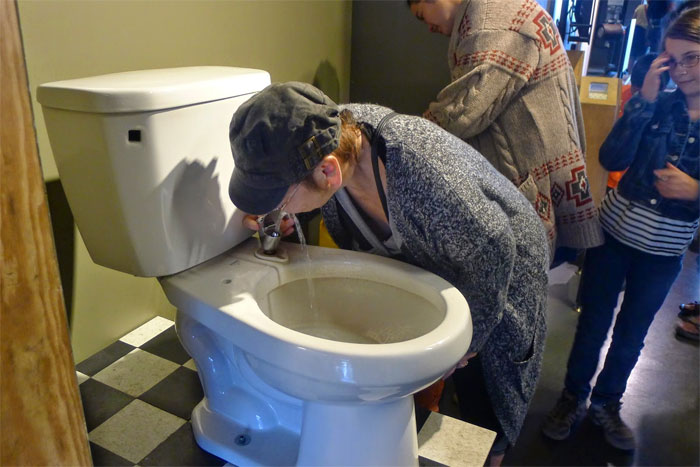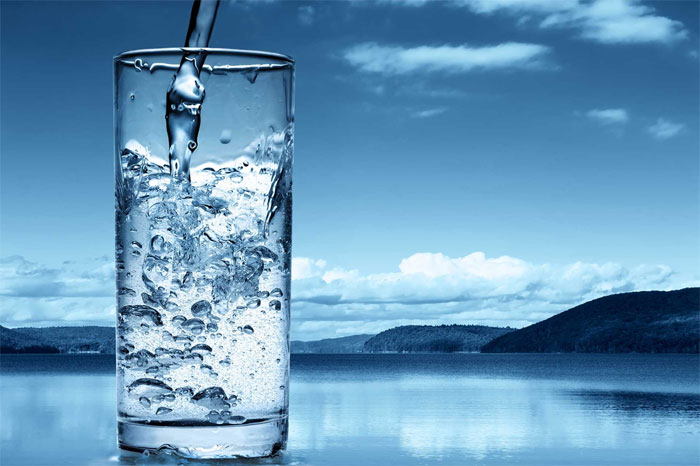Lack of clean water, humans may have to drink toilet water in the future
Listening to it is not really interesting, this "toilet-to-tap" plan can become a savior for people who don't have clean water to drink, let alone wash.
A few days ago, scientists from the Netherlands made a prediction that more than 4 billion people around the world will have to live in the absence of clean water to use within a month. This problem will peak within the next decade, so scientists in Australia have come up with a way to recycle waste water from the toilet into clean water for use, specifically drinking.

In the future, people will not have enough clean water to use.
Listening to it is not really interesting, this "toilet-to-tap" plan can become a savior for people who don't have clean water to drink, let alone wash. However, it has been applied in some parts of the world in the following general view: wastewater passes through drains, including from toilets, being filtered and treated until it is clean like pure bottled water, if not clean.
Environmental engineer Anas Ghadouani of the University of Western Australia said recycled water is safe and tastes like all bottled water or taped, even if it tastes slightly sweet. However, certainly not everyone is happy to know that the cup of water they hold on their hands comes from their daily waste.
However, the problem of climate change causes drought and high population growth, making the world's freshwater resources become overloaded.
As a result, many cities have begun to use a "toilet-to-tap" plan to recycle waste water into clean water. Recycling of waste water is not only necessary but it is also important for maintaining clean water supply in the future. Anas Ghadouani even warned that : "It is not a fiction, it is a real context that everyone faces."

Recycled water is safe and tastes like all bottled water.
In addition, chemical engineer Peter Scales of the University of Melbourne also added: "Domestic sewage of course not only includes flushing from the toilet. Think of the amount of water going down the drain every time you wash one." apple or car wash This water is an abundant unused resource, furthermore the cost of using it is much cheaper and the resource is always available. processing waste water, it can reduce water demand by 60% ".
In fact, recycling waste water for different uses is not so new. Normally, wastewater will be recycled for agricultural irrigation and other problems but often these products cannot be taken. Peter Scales says it is similar to the technology used to handle contaminated drinking water sources before turning them into clean water, and the technology has been used for many years.
Explaining more about the wastewater treatment process, Peter Scales said: "First, we have to filter out all solid substances in the water. Then you will apply a procedure called reverse osmosis. To filter out the smallest particles, the water is then exposed to ultraviolet light to disinfect the pathogenic bacteria, and even this "toilet-to-tap" method can provide a very pure water source. purer than what clean water companies can now take from rivers or from tanks ".

Lack of clean water has become a global problem.
Back to the issue of "who will drink toilet water" , psychology professor Paul Rozin of the University of Pennsylvania and colleagues conducted a survey of about 2000 people. They carefully introduced this new method and questioned whether people dared to drink this water of "everyone feels disgusting" . The results showed that although 49% said they were willing to use recycled wastewater, 13% still refused and the rest were not sure. For many people, the feeling of disgust is too hard to overcome , no matter how safe this water source is.
About 10 years ago, the government of Toowoomba (Eastern Australia) conducted a public referendum on the issue of recycling waste water for domestic use. This idea was immediately crushed without mercy when 62% of people here opposed it."Recycling of waste water to use is a very useful idea, although it is often subject to common barriers such as containment politics" - Peter Scales recounted.
Toowoomba's lesson has become a warning for many other places. Water Corporation spokesman Clare Lugar - the company responsible for water supply to Western Australia, which has endured more than 15 drought - said: "Water shortages have pushed the Toowoomba leaders into the scene. After that, they tried to apply the recycling of waste water without giving people enough time to learn and get used to it . " The company itself has begun to provide recycled wastewater, but it wants to learn from the Toowoomba case and is implementing it slowly.

Sooner or later you will have to drink recycled waste water.
In addition, Anas Ghadouani added on the issue of clean water shortage in Western Australia: "This is one of the driest places on Earth, and climate change will make this place even tougher. "In 2015, the big dam in Perth produced only 72.4 billion liters of water, less than a third of the actual demand." Since 2006, Water Corporation has been using seawater filtration method in some factories located off the Indian Ocean. The desalination process, although quite costly and expensive, is relatively effective. Currently, desalinated water accounts for 39% of the total water supply for Western Australia. Locally exploited water accounts for 43% and water in the reservoirs provides the rest.
Even so, persistent drought and an increasing population make the idea of recycling waste water become more attentive thanks to lower costs as well as less effective, even somewhat better. Water Corporation itself began testing new wastewater recycling processes in Orange County, California. They will pump recycled wastewater into aquifers, which will act as free natural tanks and be considered "psychological buffers" for users when they drink water here and there. know that it is water from their treated toilet.
In 2012, Water Corporation completed a three-year trial in Perth, dealing with millions of liters of water to change the perception of the entire process. In addition, they have built a tour program for those who want to see firsthand how the water filtration process takes place in treatment plants. Representatives of this company also had meetings with local authorities, communities and local aboriginal groups.

Many other parts of the world have begun to implement this special wastewater recycling program.
This approach seems to be working, as surveys show that the percentage of support for "toilet-to-tap" schemes is up to 70%. Currently, Water Corporation is increasing its water reserve with 10 billion liters of water in Perth being treated in 2 years 2013 and 2014. As expected, they will launch a large-scale capable plant. recycling 14 billion liters of water every year, and even increasing it to 28 billion if needed in 2017. Finally, recycled wastewater can account for 20% of Perth's water supply and the city's residents. was able to "say goodbye" to the aching drought for years.
In addition, Peter Scales emphasizes that approaching issues from different directions is very important in ensuring clean water supply for the future. For example, one of the other untapped sources of water is rainwater, if we recycle waste water and collect rainwater that has seeped into the soil, it is not a problem to supply water to an entire city. great."But the problem is that the time to make people accept the use of recycled wastewater or build infrastructure to collect this rainwater will probably take years, even decades , " Peter Scales affirmed.
Besides Australia, many other parts of the world have started to implement this special waste water recycling program: Singapore, Belgium, Namibia, and the United States . when there is a shortage of clean water has become a global problem. Every effort or present method next to the "toilet-to-tap" is aimed at a single goal: Clean water for everyone.
- Make a drink from sweat
- This small invention will save millions of people around the world from a lack of clean water
- How to go to the toilet?
- Terrifying images of the situation of depleting clean water all over the world
- Strange toilet doesn't need water
- 6 ideas to improve clean water shortage
- Never flush water when opening the toilet lid, you're hurting yourself
- Every year 1.8 million children die from lack of clean water
- 6 times of drinking water is even more poisonous than medicine
- Places with the most expensive clean water in the world
- Learn the facts startled to the toilet makes everyone surprised
- The toilet does not waste water, the great innovation was funded by Bill Gates
 Is the magnetic North Pole shift dangerous to humanity?
Is the magnetic North Pole shift dangerous to humanity? Washington legalizes the recycling of human bodies into fertilizer
Washington legalizes the recycling of human bodies into fertilizer Lightning stone - the mysterious guest
Lightning stone - the mysterious guest Stunned by the mysterious sunset, strange appearance
Stunned by the mysterious sunset, strange appearance